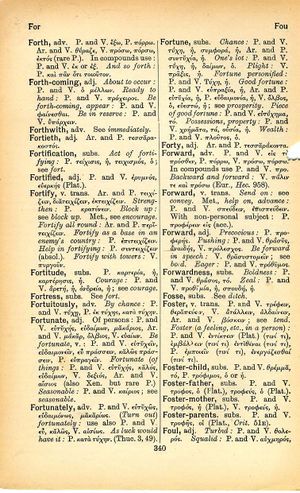fortunate: Difference between revisions
From LSJ
Μιμοῦ τὰ σεμνά, μὴ κακῶν μιμοῦ τρόπους → Graves imitatormores, ne imitator malos → Das Edle nimm zum Vorbild, nicht der Schlechten Art
(6_7) |
(D_4) |
||
| Line 8: | Line 8: | ||
{{Lewis | {{Lewis | ||
|lshtext=<b>fortūnātē</b>: adv., v. [[fortuno]],<br /><b>I</b> P. a. fin. | |lshtext=<b>fortūnātē</b>: adv., v. [[fortuno]],<br /><b>I</b> P. a. fin. | ||
}} | |||
{{Gaffiot | |||
|gf=<b>fortūnātē</b>¹⁵ ([[fortunatus]]), adv., d’une manière heureuse : Cic. Fin. 3, 26 || -[[tius]] Plin. 3, 125. | |||
}} | }} | ||
Revision as of 06:54, 14 August 2017
English > Greek (Woodhouse)
adj.
Of persons: P. and V. εὐτυχής, εὐδαίμων, μακάριος, Ar. and V. μάκαρ, ὄλβιος, V. εὐαίων. Be fortunate, v.: P. and V. εὐτυχεῖν, εὐδαιμονεῖν, εὖ πράσσειν, καλῶς πράσσειν, P. εὐπραγεῖν. Fortunate (of things: P. and V. εὐτυχής, καλός, εὐδαίμων, V. δεξιός, Ar. and V. αἴσιος (also Xen. but rare P.). Seasonable: P. and V. καίριος; see seasonable.
Latin > English (Lewis & Short)
fortūnātē: adv., v. fortuno,
I P. a. fin.
Latin > French (Gaffiot 2016)
fortūnātē¹⁵ (fortunatus), adv., d’une manière heureuse : Cic. Fin. 3, 26

